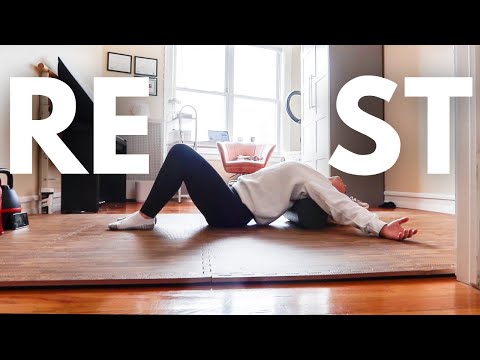The Importance of Recovery: How Rest Days Enhance Your Fitness Goals, When it comes to achieving fitness goals, the emphasis is often on intense workouts and pushing limits. However, an equally critical component of a successful fitness regimen is recovery. Rest days are not merely breaks from training; they play a vital role in muscle repair, performance enhancement, and overall well-being. Understanding the importance of recovery and incorporating rest days into your routine can significantly enhance your fitness outcomes.

1. Understanding the Role of Recovery
Why It Matters: During exercise, especially strength training, your muscles undergo stress and tiny tears. Recovery allows your body to repair these muscles, making them stronger and more resilient.
How It Works: When you rest, your body goes through several processes:
- Muscle Repair: Proteins repair the micro-tears in muscle fibers, leading to muscle growth.
- Glycogen Replenishment: Carbohydrates stored as glycogen in muscles are replenished, restoring energy.
- Nervous System Recovery: The central nervous system recovers from the stress of high-intensity workouts, improving overall performance.
- Hormonal Balance: Hormones such as cortisol (stress hormone) decrease, while growth hormones, crucial for muscle repair, increase.
2. Benefits of Rest Days
1. Prevents Overtraining
Why It Matters: Overtraining occurs when you exercise too intensely or without sufficient rest, leading to fatigue, decreased performance, and potential injuries.
Benefits: Rest days prevent overtraining by allowing your muscles and body systems to recover, reducing the risk of burnout and overuse injuries.
2. Enhances Performance
Why It Matters: Continuous training without rest can lead to plateauing, where performance improvements stall.
Benefits: Scheduled rest days enable your muscles to recover and grow stronger, leading to improved performance in subsequent workouts. You’ll find that your strength, speed, and endurance increase more effectively when you allow adequate recovery time.
3. Supports Mental Health
Why It Matters: Exercise can be mentally taxing, and the pressure to perform can lead to stress and burnout.
Benefits: Rest days provide a mental break, helping to reduce stress and anxiety. They offer a chance to recharge mentally, maintain motivation, and avoid workout monotony.
4. Reduces Injury Risk
Why It Matters: Pushing through pain or fatigue increases the risk of injuries, which can sideline you for extended periods.
Benefits: Adequate rest helps prevent injuries by allowing your body to heal and recover. This is especially important for joints, tendons, and ligaments, which need time to repair from repetitive stress.
3. Types of Recovery
1. Passive Recovery
Why It Matters: Passive recovery involves complete rest without any physical activity, allowing full recovery of muscles and energy systems.
How to Do It: Incorporate at least one or two days of passive recovery into your weekly routine. Spend these days relaxing, sleeping, and engaging in light activities like reading or gentle stretching.
2. Active Recovery
Why It Matters: Active recovery involves low-intensity activities that promote blood flow and muscle relaxation without adding stress to your body.
How to Do It: Include activities like walking, yoga, swimming, or light cycling on your rest days. These activities help reduce muscle stiffness and soreness while promoting overall recovery.
3. Sleep and Nutrition
Why It Matters: Sleep and proper nutrition are critical components of recovery, providing the necessary resources for muscle repair and energy replenishment.
How to Do It:
- Sleep: Aim for 7-9 hours of quality sleep per night. Establish a consistent sleep schedule and create a relaxing bedtime routine.
- Nutrition: Focus on a balanced diet rich in protein, healthy fats, and complex carbohydrates. Consider post-workout nutrition, such as a protein shake or a balanced meal, to aid recovery.
READMORE: Overcoming Fitness Plateaus: Strategies to Boost Your Progress
4. Implementing Rest Days into Your Routine
1. Plan Your Rest Days
Why It Matters: Planning ensures you consistently incorporate rest into your routine, preventing the temptation to overtrain.
How to Do It: Schedule at least one or two rest days each week. If you’re doing high-intensity workouts or strength training, consider more frequent rest periods. Customize your rest days based on your fitness level and goals.
2. Listen to Your Body
Why It Matters: Your body will often signal when it needs rest through signs of fatigue, soreness, or decreased performance.
How to Do It: Pay attention to these signals and adjust your routine accordingly. If you feel unusually tired or sore, take an extra rest day to allow full recovery.
3. Stay Active on Rest Days
Why It Matters: Staying lightly active can enhance recovery by promoting blood flow and reducing muscle stiffness.
How to Do It: Engage in light activities like walking, yoga, or gentle stretching on rest days. These activities help maintain mobility and flexibility while aiding recovery.
4. Prioritize Mental Recovery
Why It Matters: Mental recovery is as important as physical recovery for maintaining long-term motivation and well-being.
How to Do It: Use rest days to relax mentally. Engage in activities you enjoy, practice mindfulness or meditation, and spend time with friends and family. Reducing mental stress can significantly enhance your overall fitness journey.
Conclusion
Incorporating rest days into your fitness routine is crucial for achieving your fitness goals and maintaining overall health. Understanding the importance of recovery, planning your rest days, and listening to your body can help you avoid overtraining, enhance performance, and support mental well-being. Remember, rest is not a sign of weakness but a critical component of a balanced and effective fitness regimen.
